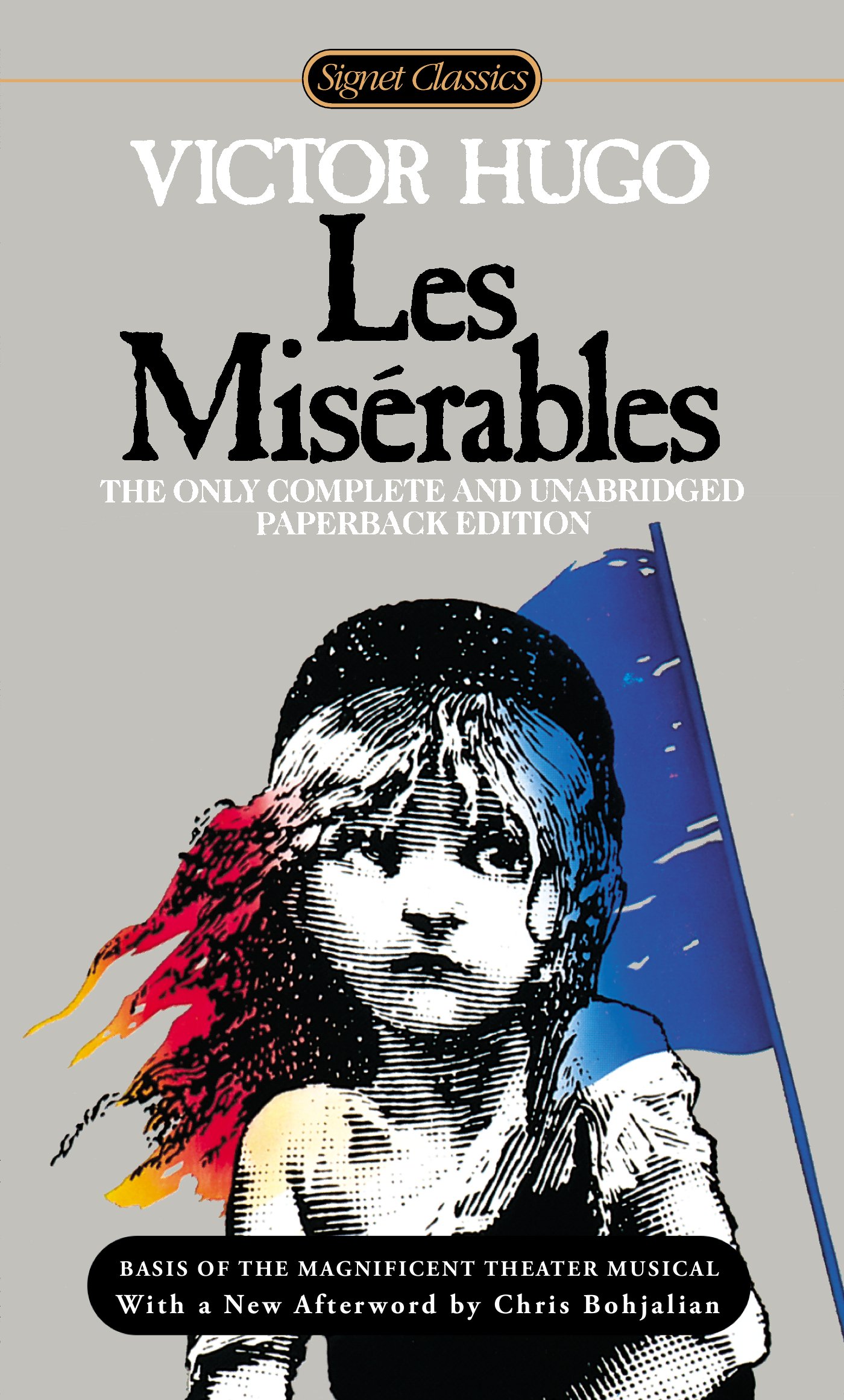20. Les Miserables by Victor Hugo
Theme/Topic: book originally written in another language
Introducing one of the most famous characters in literature, Jean Valjean - the noble peasant imprisoned for stealing a loaf of bread. In Les Misérables Victor Hugo takes readers deep into the Parisian underworld, immerses them in a battle between good and evil, and carries them onto the barricades during the uprising of 1832.
Within his dramatic story are themes that capture the intellect and the emotions: crime and punishment, the relentless persecution of Valjean by Inspector Javert, the desperation of the prostitute Fantine, the amorality of the rogue Thénardier and the universal desire to escape the prisons of our own minds. Les Misérables gave Victor Hugo a canvas upon which he portrayed his criticism of the French political and judicial systems, but the portrait which resulted is larger than life, epic in scope - an extravagant spectacle that dazzles the senses even as it touches the heart.
My Review:
I've been a fan of the musical for several years. In addition, I took French for all four years in high school. It's only fitting that I chose Les Miserables since it was originally written in French.
I've wanted to read Les Miserables for awhile. When a musical and/or movie gets produced based on a book, I have a tendency to want to read that particular book to see what inspired them to transform that book into a stage production or movie. No matter what avenue is produced and developed, there are always parts that have to be taken out for whatever reason. Saying that, it's nice to read the book to get the full story.
Les Miserables is classified as a historicalfiction novel. It was good getting to know what about a period in France's history, which in this case includes the uprising/rebellion of 1832, an attempt of the republicans to overthrow the monarchy. Victor Hugo used the platform of writing Les Miserables to portray his criticism of the French political and judicial systems. He wrote elaborately, a bit too much at times in my opinion, about a time in French history that not everyone in other countries may know.
Jean Valjean is a perfect example of being someone with a criminal background trying to make a change once he gets out of prison. In reality, sometimes ex-offenders change for the better once they get done serving their sentence and sometimes they just don't or can't seem to escape that lifestyle. I felt that Jean did want to change and there were two specific moments that solidified that for me. Other than when he was monsieur le maire (mayor), the first time would be when he rescued Cosette from the Thenardiers and became her father figure. The second time would be when he rescued Marius and saved his life in a way because he knew Cosette was in love with him (Marius).
I'm going to end this with something that's not always known to the general public so to say. At the end of the novel, there's a paragraph/letter that Victor Hugo sent to his Italian publisher, in which he laid out his ambitions for Les Miserables (1):
I don't know whether it will be read by everyone, but it is meant for everyone. It addresses England as well as Spain, Italy as well as France, Germany as well as Ireland, the republics that harbour slaves as well as empires that have serfs. Social problems go beyond frontiers. Humankind's wounds, those huge sores that little the world, do not stop at the blue and red lines drawn on maps. Wherever men go in ignorance or despair, wherever women sell themselves for bread, wherever children lack a book to learn from or a warm hearth, Les Miserables knocks at the door and says: "open up, I am here for you".Victor Hugo also addresses the purpose of the novel in the preface (3):
So long as there shall exist, by reason of law and custom, a social condemnation, which, in the face of civilization, artificially creates hells on earth, and complicates a destiny that is divine with human fatality; so long as the three problems of the age—the degradation of man by poverty, the ruin of women by starvation, and the dwarfing of childhood by physical and spiritual night—are not solved; so long as, in certain regions, social asphyxia shall be possible; in other words, and from a yet more extended point of view, so long as ignorance and misery remain on earth, books like this cannot be useless.Near the end of the novel, Victor goes on to address the work's overarching structure (2):
The book which the reader has before him at this moment is, from one end to the other, in its entirety and details ... a progress from evil to good, from injustice to justice, from falsehood to truth, from night to day, from appetite to conscience, from corruption to life; from bestiality to duty, from hell to heaven, from nothingness to God. The starting point: matter, destination: the soul. The hydra at the beginning, the angel at the end.References:
1. Behr, Complete Book, 39-42
2. Alexander Welsh, "Opening and Closing Les Misérables", in Harold Bloom, ed., Victor Hugo: Modern Critical Views (NY: Chelsea House, 1988), 155; Vol. 5, Book 1, Chapter 20
3. Sinclair, Upton (1915). The Cry for Justice: An Anthology of the Literature of Social Protest. Charles Rivers Editors. ISBN 978-1-247-96345-7.
Happy Reading and Keep on Writing!
Meg

No comments:
Post a Comment